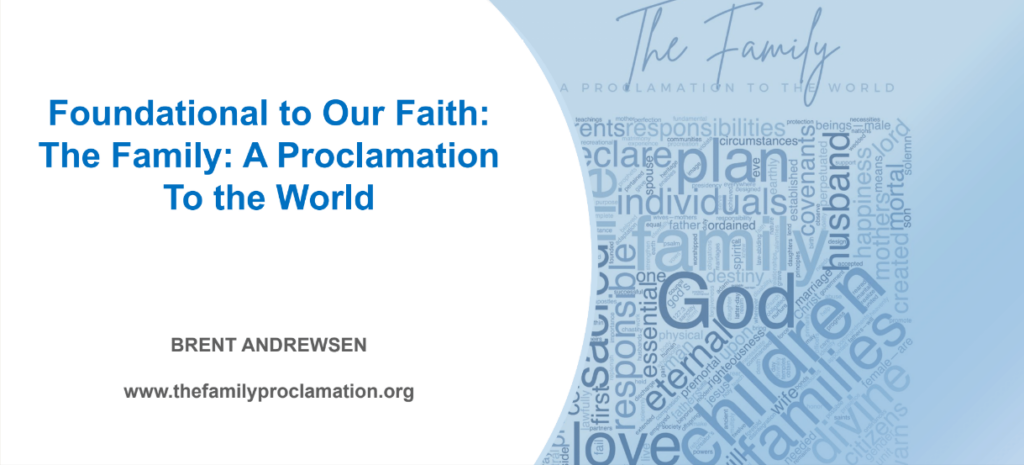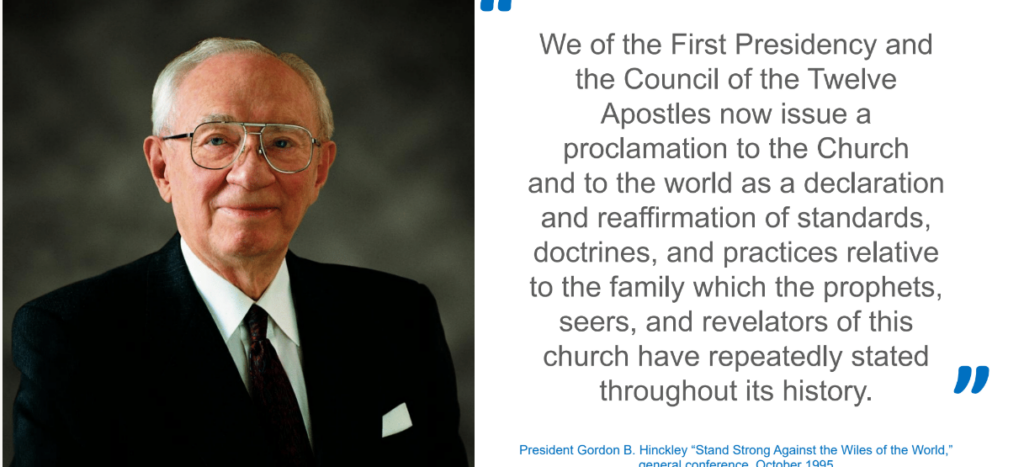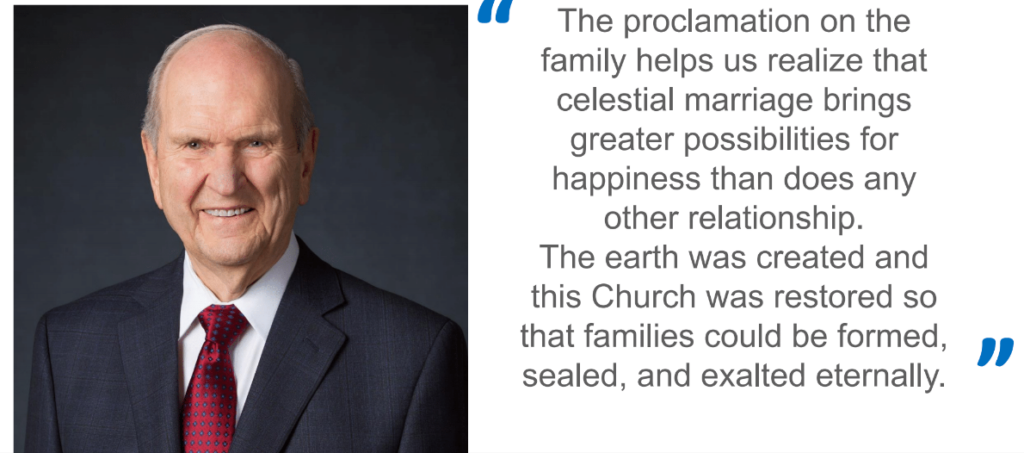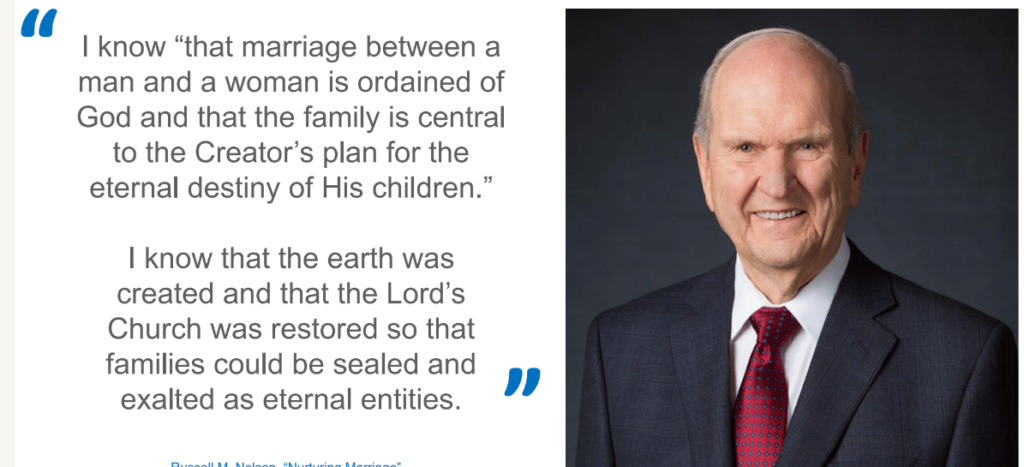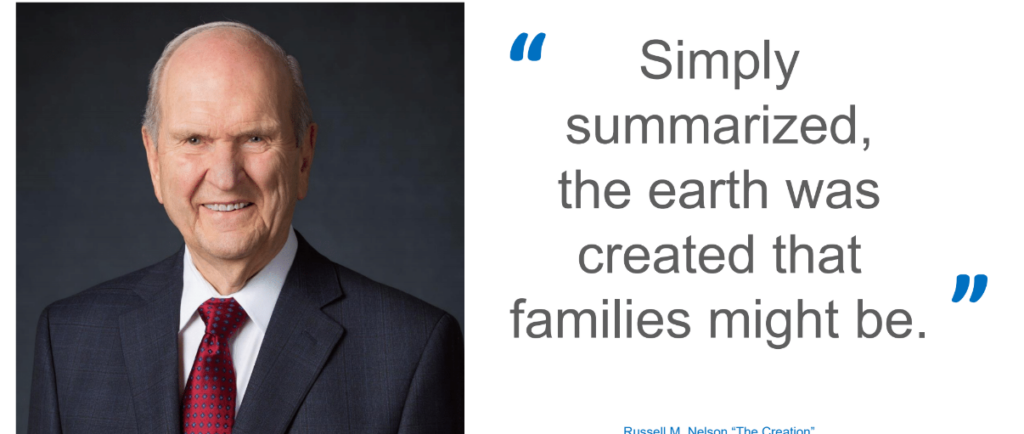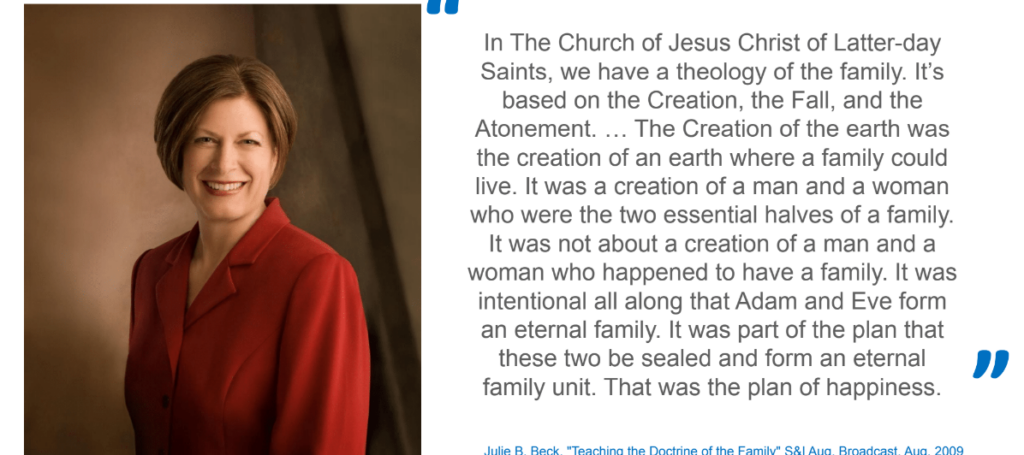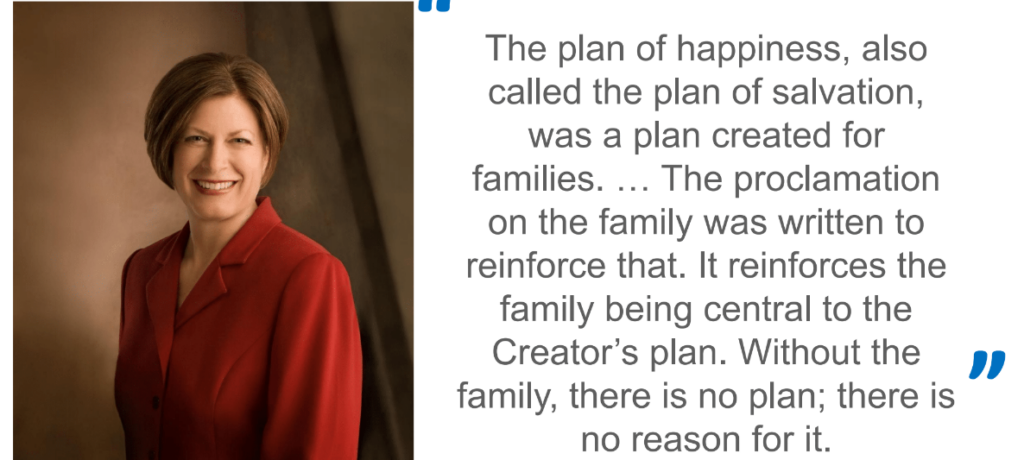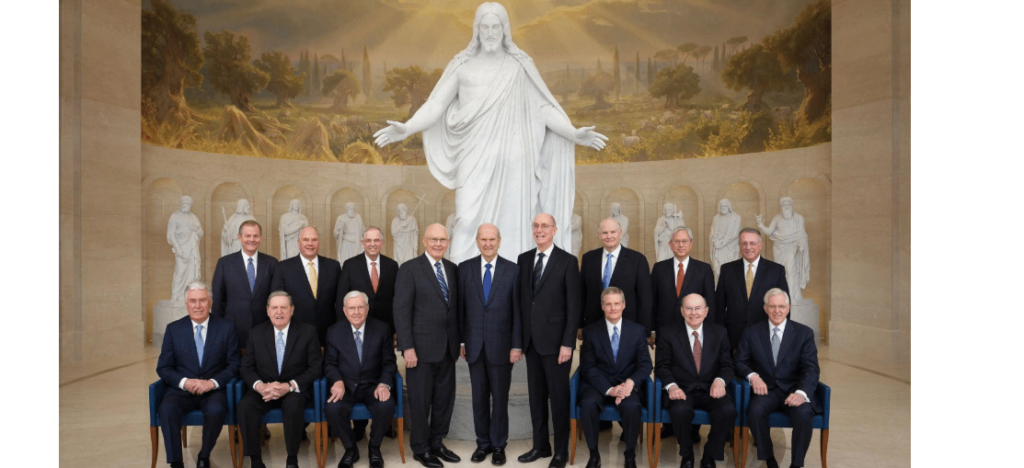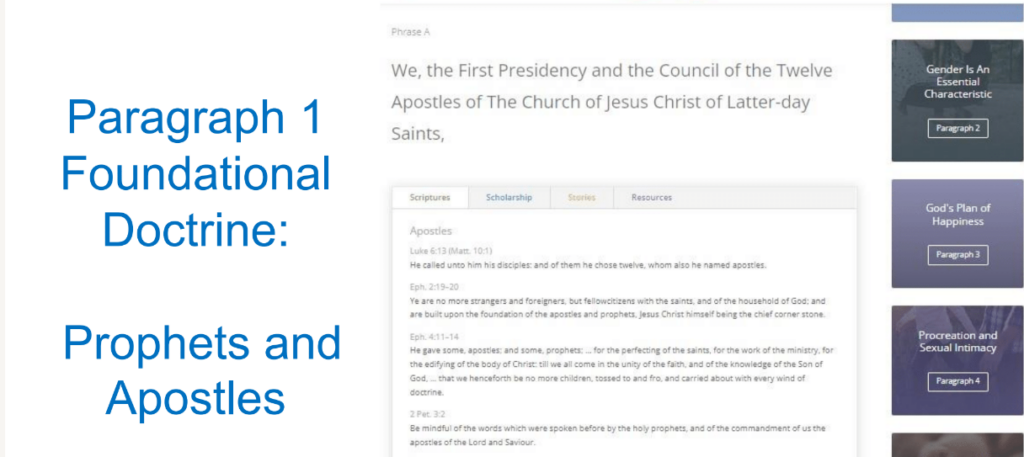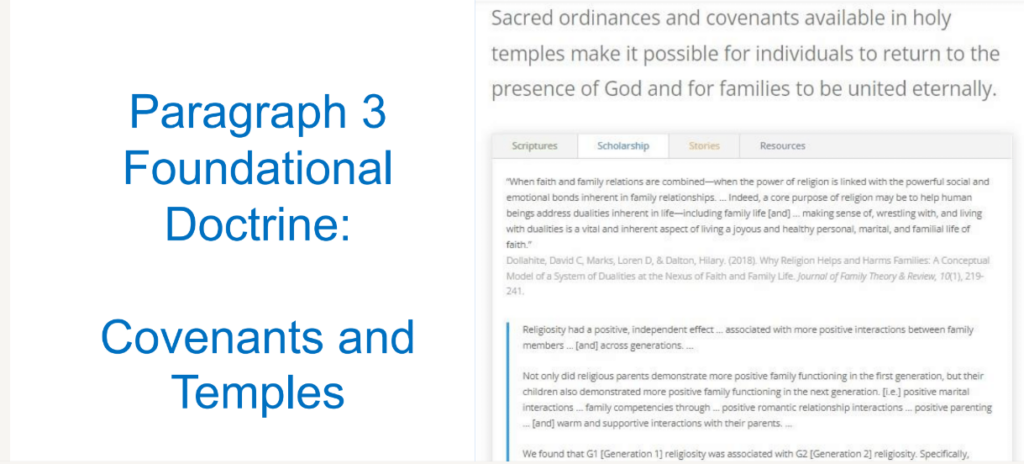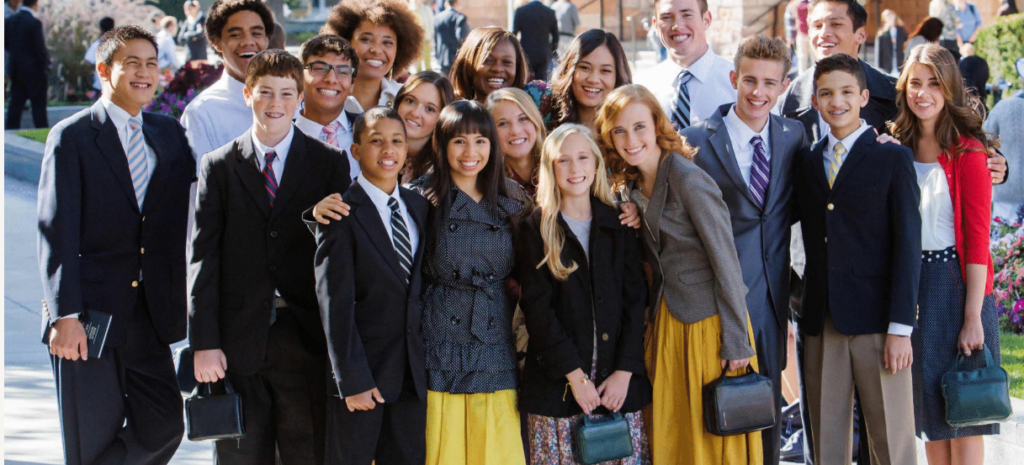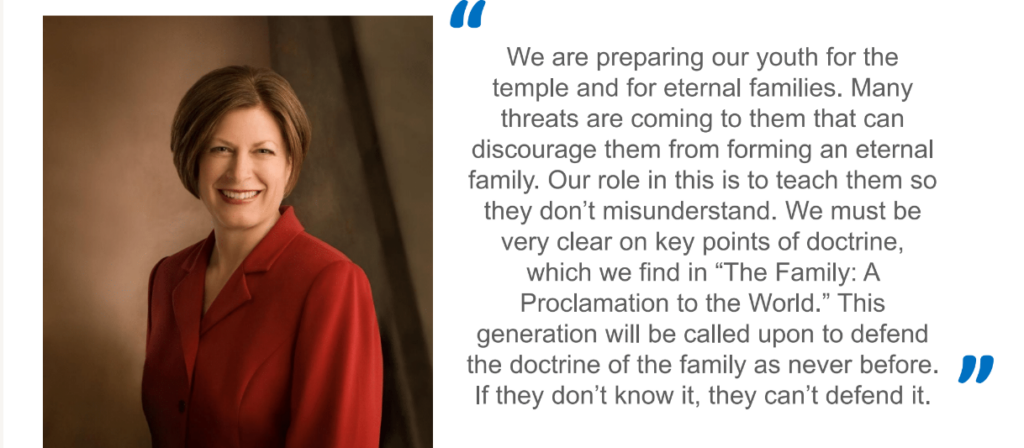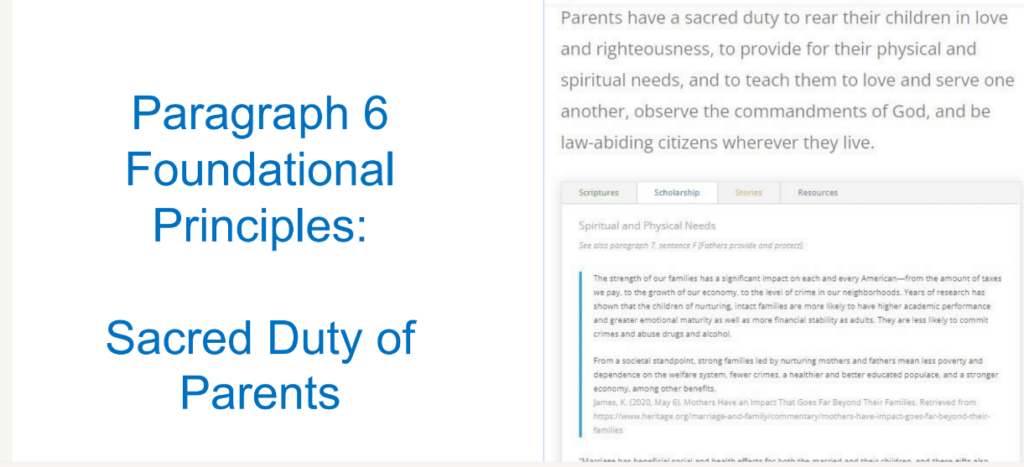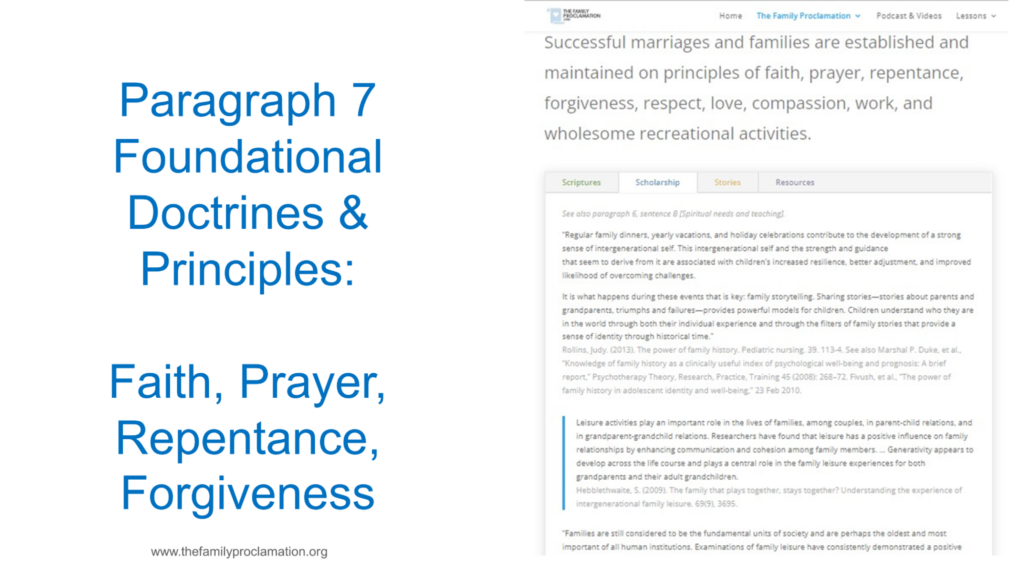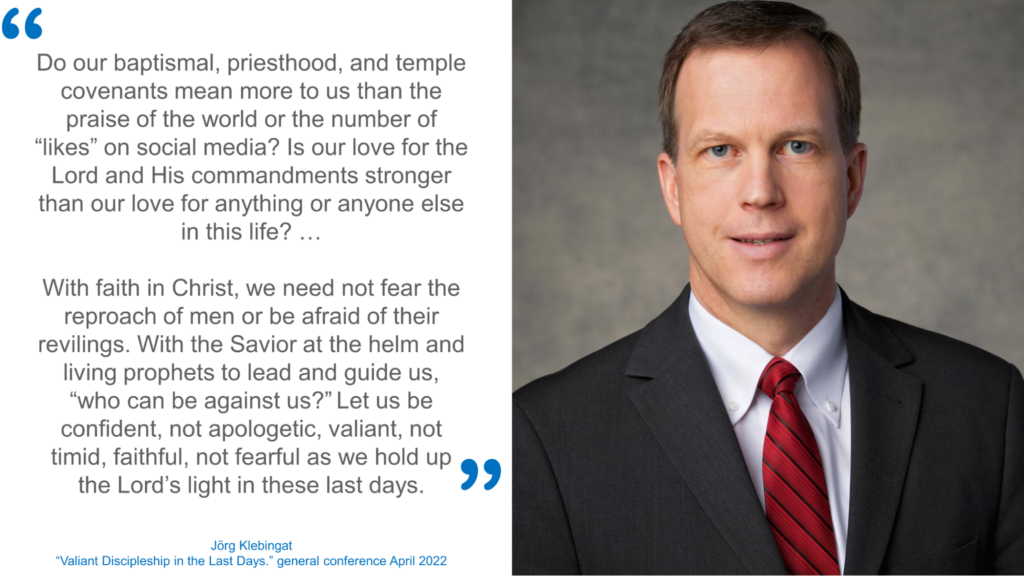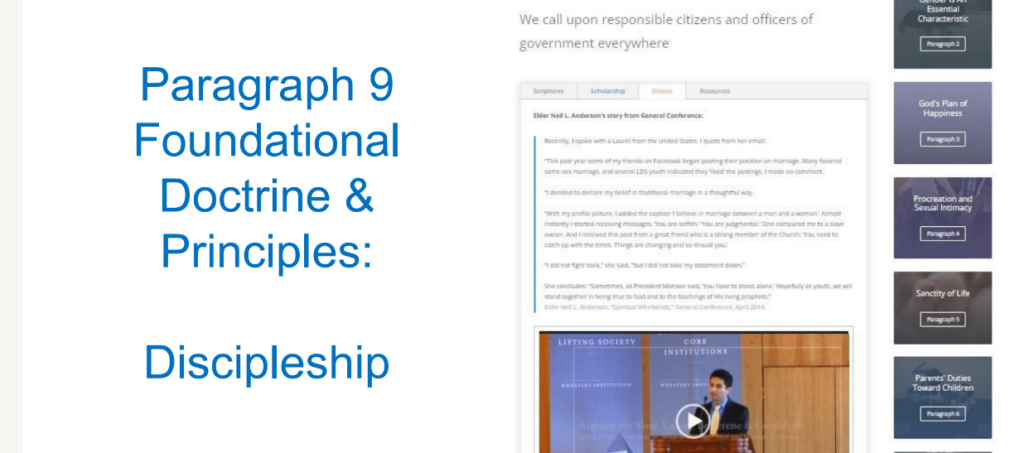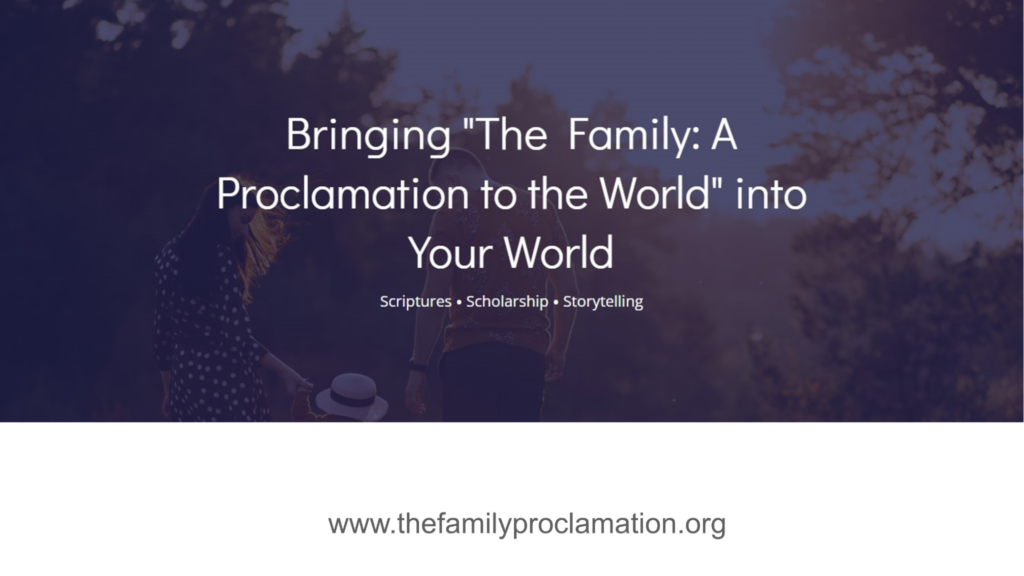Brent Andrewsen explore the principles outlined in “The Family: A Proclamation to the World,” emphasizing its foundational role in Latter-day Saint doctrine. He discusses its teachings on marriage, family and covenants, addressing contemporary social issues and highlighting the eternal significance of these principles in personal and societal contexts.
This talk was given at the 2022 FAIR conference on August 4, 2022.

Brent Andrewsen, an accomplished attorney and chairman of the Sutherland Institute Board of Directors, leverages his legal expertise and dedication to Latter-day Saint doctrine to provide profound insights into the enduring significance of “The Family: A Proclamation to the World.”
Transcript
Brent Andrewsen
Introduction
Thank you. I appreciate the opportunity to be here. My background and experience does come more in the law, but my interest in this topic certainly predates that.
I grew up in a home of two parents, both of whom were converts to the Church. Their parents both came from divorced families and my parents regularly talked about the importance of trying to figure out a way to stay together as a family and as a couple. They taught us about the importance of the principles of the gospel and the importance of the restored gospel and the role that the Church plays in that.
My Mission
My favorite song growing up was, “I Hope they Call Me On a Mission.” I was very interested in serving as a missionary from the time I was little. As a missionary in Argentina, I served in the Bahia Blanca Mission from 1992 to 1994.
So just about a year before the family proclamation came out, there was in the old handbook, the old missionary handbook, (those who might have served during that time period remember this little white handbook) there was an instruction there that talked about importance of working with individuals, but if possible, trying to find families and teach families. And that caused me to ponder a lot as a missionary about why. Why would there be this instruction? We’re to just go to teach to all the world, but why a specific emphasis on families?
So I pondered a lot on what role marriage and family have, even as a missionary, and fortunately my very last Sunday as a missionary, we had found a family, a complete family, about a month before that, and they were interested in the gospel.
Family Baptisms
My father actually worked for the Church and came down, and I had the opportunity to go home early. He and my mom were going to come down. His job assignment was ending just a week before my official release date and I had that opportunity to go home, and my Mission President said, “It’s up to you. I don’t care what you do. You can leave early if you’d like. We can make arrangements to backfill your assignment and do some other things.”
But I knew that this family had a baptismal date and I knew that my opportunity as a single missionary was a once in a lifetime opportunity, so I politely told my parents that as much as I was glad that they were interested in coming down, I really wanted to stay ‘till the very end, and fortunately had that Sunday to see an entire family, and I can still picture them. Their oldest child was nine, and so Mom and Dad and a little girl dressed in white, and there was a special feeling, more than any other experience I had as a missionary, in seeing that entire family dressed in white.
I had two other experiences working with families who had not been active in the Church for a number of years as a missionary, and then they sent me pictures of them going to the temple after we had spent some time helping activate them.
Families are Foundational
Fast forward then to me coming home and going through the temple with my wife a few months later. We had dated before my mission. (I actually do have a friend who married somebody from his mission and he always gets punched when he tells people that their first date was at a zone conference.)
My wife did not serve a mission with me but we dated before my mission. I did get a “Dear John,” but it didn’t take, and so we’re sitting there in the temple several months after I got home from my mission and the temple sealer said to both of us, he had asked about our background, he knew both of us had been baptized at the age of eight, he said, “Everything you’ve done in life to this point in the Church especially, has been to get you to this point for this pinnacle ordinance that qualifies us for exaltation.”
And again, it kind of brought forward to me, brought to my mind, all those other experiences, why there was such a special feeling I had about helping activate some families who made it to the temple and also baptizing or helping participate in the teaching and baptizing of this entire little family who planned then to go to the temple. It really is because, I think, foundational to our doctrine is the principle of family.
Principle of Family
And we’ve got some quotes here. We start here with this first quote from President Hinckley when he introduced this, mentioning that he and the rest of the First Presidency and Quorum of the Twelve were going to issue a proclamation to the world to reaffirm standards, doctrines, and practices relative to the family, which prophets, seers and revelators of this Church have repeatedly stated throughout its history.
One of the things that we’ll talk about briefly in the project that Skyline Research Institute has endeavored to put out there in the thefamilyproclamation.org, is to highlight that in fact these principles are not just ones that have been stated by prophets, seers and revelators in this dispensation, but really throughout all time. These are Eternal principles.
The Role of Marriage
Our current prophet has emphasized the role of marriage and the importance of the principles in the family proclamation numerous times prior to him being President of the Church and since.
Here he says that the proclamation of the family helps us realize that celestial marriage brings greater possibilities for happiness than does any other relationship. The earth was created and this Church was restored, so that families could be formed, sealed, and exalted eternally.
Here he talks about, you’re all familiar with the scripture in Doctrine and Covenants section 49 verses 15 and 16. Here President Nelson reaffirms a truth taught to the Prophet Joseph Smith, that marriage is ordained of God and that the very purpose of the earth’s existence and its creation is fulfilled through marriage, and of course what comes through eternal marriages.
Sister Beck gave a wonderful talk. If you’ve never read this talk that she gave back in 2009, former Church General Relief Society President on the importance of the doctrine of the family, I really strongly encourage you to.
Purpose of Creation
We’ve pulled a few quotes here in the presentation talking about the importance to our theology that the family has in the creation of the earth. Again, she reiterates the same principle: the creation of the earth was so that families could live, and that it is not just the case or happenstance that God formed Adam and Eve to form a marriage, but that was why they were here. This was not just something that was happenstance upon the earth forming, it was part of the plan that they would be sealed as a family unit.
Again, some of these quotes kind of speak for themselves, so in order to get to some other things, I won’t necessarily go through all of them; but really, you see here the very last sentence:
Without the family there is no plan and there’s no reason for it,”
and our doctrines and truths bear that out.
thefamilyproclamation.org
Now as I talk about that website, thefamilyproclamation.org, and the project founders of that, (and I’m so happy to have gotten involved and had the opportunity to be part of that project) the purpose behind that, I think the family proclamation is, I’ll use the term “weaponized,” at times.
People, in an effort to proclaim our gospel doctrines and truths and to see those maybe have some bearing in public policy, have at times perhaps weaponized the family proclamation, and it makes for sometimes uncomfortable conversations and uncomfortable circumstances and situations, and yet there’s a lot more; and usually that’s in the realm of LGBT rights, whether it’s same-sex marriage or other areas, but the reality is if you read all nine paragraphs of the family proclamation, there are a lot of profound doctrines, all pertaining to the family, and that’s why the proclamation is titled, The Family: A Proclamation to the World.
And so the interest of the founders of Skyline Institute and thefamilyproclimation.org, was to highlight in its entirety, principles of the gospel and our doctrines related to the family, and not just emphasize things that might be sometimes unintentionally controversial, but also not to back down from teaching these core eternal, foundational principles, because they are that.
New Experiences
I’m going to talk about one of the things that is relatively new in my life. I mentioned some of my mission experiences, and again how long that’s been, I’ve spent the last, I guess I’ve been home for nearly 30 years. I have four children myself. We, my wife and I, have a 26 year old daughter who’s married and a 22 year old daughter who’s married. The 26 year old has a little baby, so I have a little two-year-old who walks around calling me “Grandpa,” and that’s been a new experience, a fun one, but one that makes me feel old, and it’s highlighted again for me, some of the importance of these principles.
Also, in the last four months now, I was called to be a bishop. I’d served in different callings in the Church in the past where I’ve seen the principles of the family proclamation, and other principles of the gospel, have some bearing, but it’s just in the last four months, that some of the things that I’ve seen, as it relates to the family proclamation and the needs that we have to make sure that these doctrines are understood, have never been clearer to me, given my current assignment.
So let me talk about a couple of experiences that I’ve had over the years, and some things that I’ve seen that make the principles of the family proclamation foundational and important.
The Apostles and Priesthood Keys
So, first, here we have a picture of the Apostles at the Rome Temple, the First Presidency and the Apostles. Interestingly, just two days ago one of the groups that I work with, one of the Church affiliates, one of their trust officers is getting ready to retire and he mentioned that just a week ago he was here at the Rome Temple, at this Visitor Center.
And as he walked through the doors and saw the Christus and the ancient Apostles standing there, he had this picture in his mind. It came to his mind, he said it was very fleeting but very profound, that our Church is led by a prophet, seer and revelator who holds priesthood keys, and that there are 14 other men in addition to him who also hold priesthood keys, and are exercising them throughout the world.
Those same keys that existed, that were conferred on Peter and the other Apostles are on the earth today. And that is one of the very first foundational principles that the family proclamation makes clear.
In its very introduction, it says, “We the First Presidency and Council the Twelve Apostles of the Church of Jesus Christ of Latter-day Saints. . .” and then it proceeds to declare some truth, or reaffirm as President Hinckley said, some doctrines and principles and truths we have seen.
Prophets, Seers, and Revelators
I have seen the concept or principle of prophets, seers, and revelators, and the role that they play in declaring the doctrine of God, and of his Son, Jesus Christ, under attack more than any time in my life, and The Family Proclamation is a document we have now to add to the restoration. The proclamation is a point in time where we see the principle of prophets, seers, and revelators made clear; that they actually have a role to play to declare for God, truth.
I have a friend who’s left the Church. We remain really close friends. We lifted weights for a long, long time together until Covid hit and the gyms got shut down, but we would talk about things. And it was interesting, his falling away from the Church started with having doubts and concerns about the role of prophets, seers, and revelators, and whether or not anyone on earth really can speak for God. And we’ve talked many times over the years about the family proclamation as just one example of why they have an important role, and what that role is.
Scripture Scholarship and Stories
In this slide, one of the things I hope you can see here is that one of the features of the familyproclamation.org website is that it combines scripture scholarship and then stories, personal experiences about the principles of the family proclamation.
And so, if you go to paragraph one for instance, on the website you will see that you can pull up scriptures from the our canon, the Old & New Testament, Doctrine and Covenants, Pearl of Great Price, and Book of Mormon, as well as quotes from modern prophets, about the principles. Sometimes it’s just a phrase, sometimes it’s a line, sometimes it’s a word, but you will see scriptural support for the principles in the family proclamation.
If you go to the scholarship, you’ll also see some secular scholarship that supports the principles that are in the family proclamation, and then also the stories tab. You will see stories where people talk about how these principles have had application in their lives.
So that’s one foundational principle to our beliefs and doctrines, that God calls prophets and assigns them responsibility, gives them priesthood keys to administer ordinances, and I’ll talk about that in a minute.
Just last week, my third oldest, my son, went through the temple for the first time, last Wednesday. Now many of us have probably been to the temple many times. I hadn’t been to the temple for a few years with someone for the first time, and as a male, I was his escort. My wife had been the escort for two older daughters and sat in the instruction by the temple president for that, but I had the opportunity to do that with my son just a week ago yesterday.
One of the foundational principles or doctrines in paragraph three is that sacred ordinances and covenants available in holy temples make it possible for individuals to return to the presence of God, and for families to be united eternally.
Exaltation
Now, just from last conference, President Oaks, and if you haven’t listened or read his talk on Divine Love in the Father’s Plan, I think it’s one of the best talks he’s given because it so clearly goes through the role that God’s love has for us in the principles of the of the Plan of Salvation. He certainly ties in the family proclamation, but he highlights that we teach certain principles in the Church of Jesus Christ of Latter Saints because the purpose of the doctrine and policies of this restored Church is to prepare God’s children for salvation in the celestial glory, and more particularly for exaltation in its highest degree.
As I sat there with my son and pondered him going through for the first time and receiving the instruction that we receive in the temple and participating in the endowment, both the initiatory and the the endowment ceremony itself, and then thought about what awaits him when he has the opportunity to be sealed to a spouse, it was again abundantly clear to me that this piece of the family proclamation, the importance of sacred ordinances and covenants, is truly foundational. It is essential for exaltation, and not just the happening of those covenants, which is critical and important, but the instruction that we receive and that that involves and leads ultimately to the formation of families, and the role of families, the role of men and women in in the plan, and in heaven.
Primary Responsibility of Parents
I’ve mentioned my family a fair amount. Another important piece of the family proclamation relates to the role that we have, principally as parents, to prepare our youth and those within our families for these principles.
Again from Sister Beck’s talk I referenced earlier. We see that there are many threats, that are coming to our families, and that can discourage them from forming an eternal family.
Our role in this is to teach them so they don’t misunderstand. We must be very clear on key points of doctrine, which we find in The Family: A Proclamation to the World. This generation will be called upon to defend the doctrine of the family as never before. If they don’t know it, they can’t defend it.”
This was from 2009, and I would say in the last 13 years, we’ve seen how quickly things have changed here in our society, and sometimes even the Church. I really kind of never understood whether or not it was an error in accounting for time in the Book of Mormon, but just before the Savior came, Lachoneus and Moronihah, I believe, had led the people to be righteous and they conquered the Gadianton robbers. And then five years later they’re ready for destruction, and the whole government collapses and they form tribes and everything else. I thought that there has to be an error in defining the time period as that short, but I don’t believe that anymore. So I’ve always found it very important to have the primary responsibility for teaching these principles, to be my responsibility and my wife’s responsibility.
Teaching Truth
My kids sometimes have declared how tired they are of us discussing that. Sunday dinner, some of these things may be in response to something they said or some TV program they had watched. We were watching TV just a few weeks ago and I paused, because we all can pause now. I don’t know if anybody just watches live TV anymore but everything’s streamed and so you can pause. And I can’t remember what show it was, whether it was Seinfeld or something else (Seinfeld, seems to have made a resurgence, everybody’s watching it again), and I paused and said, “Now let me tell you why what this episode is portraying is so bad.”
“Oh, Dad. Come on.” And we go back to some of these principles, and I said, “Guys, my primary responsibility as your father is to teach you truth, and I’m sorry, I felt my responsibility was important to fulfill right now.”
“Well can you do it after the episode?” It takes away some of the humor if you do it that way, but we do have this primary responsibility.
Preparation in the Home
A few years ago, I don’t know if you remember a talk Elder Bednar gave, again to drive home this principle. He said,
You know, we have a Missionary Training Center in Provo and Missionary Training Centers around the world, but the primary Missionary Training Center is in your homes. We do Temple preparation. We have temple preparation classes that occur with temple and family history leaders in the ward, but the primary temple preparation happens within the home.”
So this is a long standing principle. There are several places in the Doctrine and Covenants and elsewhere that highlight that the primary responsibility for teaching the gospel rests with parents within the home. So here we have this sacred duty, and I have certainly felt that, and it’s something that the family proclamation reminds us of and teaches as a foundational principle.
Raising Children
Going back to President Oaks’ talk from just last conference, he highlights the fact that the principles of The Plan of Salvation that provide for marriage and family and rearing of children, again are eternal principles, so that God’s children can have these truths taught.
It’s true that most of the world’s population, most children born in the world, are not born to families within The Church of Jesus Christ of Latter-day Saints, but there have been, and are, some foundational principles that apply, and I think come from people intuitively through the Light of Christ that they have, that their responsibility as parents is to help teach and bring their children along.
Now we know there are exceptions to that. We know that there are exceptions to the core family. My ward happens to be the ward with the greatest number of both widows and single sisters in our entire stake, so teaching and talking about some of these principles, and using a term like “parents,” is a sensitive issue, but we have to be able to talk about things in the context of the ideal.
The Ideal
There’s a quote that I read some time ago from President David O. McKay. I’m going have to paraphrase. David O. McKay taught that throughout all that we do, in the back of our mind always ought to be the ideal. He was referencing specifically the ideal of Jesus Christ, the one perfect and sinless man who ever lived, but I think the principle that David O. McKay was trying to drive home was that only by remembering that there is an ideal to aspire to, will we ultimately be successful upon life’s journey. If we don’t keep the ideal always in the back of our minds, always as something to aspire to, that will ultimately be a cause for our failure during life.
I think that same principle applies here. We talk about some of these core doctrines and principles in the family proclamation, even when life circumstances are not perfect, and we don’t have, whether in our own family, or families around us, the ideal. But we have the ideal there as something to aspire to, and something to remember that God has promised.
President Oaks reminds us in his last talk, the truth that the opportunity for exaltation is available to all. That’s something that’s always been taught. Every man, woman, or child born, every human being born on this Earth, has the opportunity for exaltation, which comes through the application of some of these principles.
Successful Marriages and Families
Again one of the things I’ll just say, why I love the the whole family proclamation, is because again, so often we hear it referred to only in a certain context, and yet here is the principle that
Successful marriages and families are established and maintained on principles of faith, prayer, repentance, forgiveness, respect, love, compassion, work, and wholesome recreational activities.”
I don’t know if everyone had the same experience, I know not all did, but the statistics that came out of Covid about the increase of abuse and broken marriages and families were higher than anybody had hoped for and were unfortunate. However, talking to many people in our neighborhood, and friends and family, Covid did provide the opportunity to deal with some of the stress and strain of being home and not having kids in school, and all those things that came with it, to remember this principle from The Family Proclamation.
Opportunities
There were more opportunities for faith and prayer and repentance, and looking at forgiveness and the need for respect and love. Respect for space, as my wife had a part-time job and had to find a place where she could be logged into the Wi-Fi, where my adult daughter and her husband both had their separate needs and space for jobs and other things, and then two kids still in high school. I just went into the office, I figured no one was going to be there so I didn’t stay home, but there were lots of opportunities to try to make space and find opportunities to do these things.
We also found that because we couldn’t go do so many of the things that we wanted to do, trips were off. We had planned to take our two youngest children to China. They had both been in the Chinese immersion program and this was going to be our big trip in July of 2020, to take them to China and tour around a little bit and watch them use their Mandarin. We had to find other wholesome recreational activities around the home because movie theaters were closed and recreation spots for multiple people were all closed. So we played a lot more games and did puzzles and did all sorts of things together. Again, these are some foundational principles, why we’re here, how we learn, how we grow.
Multiple prophets and apostles have taught that how we grow individually, how we learn how to forgive and improve, ultimately comes to the testing that we receive by having families.
Worthwhile Difficulties
Our wedding anniversary falls on the 3rd of November so every few years our anniversary falls on fast and testimony Sunday. So I got up and said, “Brothers and sisters, I’m pleased to share that today is our anniversary. We’ve had 15 happy years of marriage, and seven other years that were not so happy.” My wife, who I think may be here, just shook her head and said, “Oh, you.”
But anybody who has been married knows that marriage, like anything worthwhile, is difficult. Rearing children is difficult. We can’t wait for our son to leave on his mission. In September he is going to Taiwan by the way, so he’ll get to use his Mandarin, but it is the experience of life that we encounter bumping into one another, it’s one of the purposes. Elder Christofferson said this years ago, referring to the Church, but it starts with our families, where we have the opportunity to kind of bump into one another and experience different interests and try to have a common purpose. It all starts with the family, and it starts with one another.
LDS Influencers
One of the things that we also see in today’s day and age, and why this relates back to paragraph seven, as well some of the foundational principles and doctrines, as well as paragraph one about prophets, seers, and revelators, we live in a day and age where there are many influencers. Years ago maybe there was the term influencer.
There have always been people, media people, and other influential people in business. I mean Dale Carnegie sold millions and millions of books talking about how to win friends and influence people, so there have always been people who have had an influence on the greater society, but I don’t think we’ve had as much of that in the past, when people had to go to books or had to go find resources. Now you can log in, and I sit and watch my kids just sit there with their phones and flip through.
And there are LDS influencers. That term is used, and I think most, if not all, or I’m going to assume, they’re all well-intentioned, but given where the world is, one of the risks I see to our children is that some of these influencers have concerns about the family proclamation, let’s say, again, in part because of, I think, how it’s been used to only ever talk about LGBT issues, which is unfortunate.
But as a result, some of these influencers will pick pieces of our doctrines, pieces of even maybe a line that might be in the family proclamation, and whether they denigrate other pieces of it, or simply omit them all together, we end up with only a partial a subset of the actual full doctrine and foundational principles that we believe in.
Not Apologetic
Elder Klebingat gave a talk last conference about this. You know, if we care more about our likes on social media than we do about the Lord and His Commandments, that’s a problem. So,
With faith in Christ, we should not fear the reproach of man or be afraid of their revilings. With the Savior at the helm and living prophets to lead and guide us,’ who can be against us?’ Let us be confident, not apologetic; valiant, not timid; faithful, not fearful, as we hold up the Lord’s light in these last days.”
A Personal Example
Another example, again, I apologize for using so many personal examples, but they’re the closest to home for me. Our adult daughter living in our ward was asked to speak a couple of years ago. She and her husband were given the topic to talk about – they were a newly married couple expecting their first child. Those did go hand in hand. They had their baby almost nine months, not quite to the day, actually. I give them a hard time about that – nine months after they got married, they had a honeymoon baby. But she was asked to talk about being a new family. So, my daughter talked and referenced the family proclamation. She didn’t touch on any social topics overtly, but she did unapologetically teach various principles of the whole family proclamation, including marriage and having children.
It was interesting; I’ve heard of friends in places throughout the Church where it’s almost verboten to even reference the family proclamation. People are uncomfortable about it, and again, I think that’s unfortunate. Our ward has never felt that way. I think people are sensitive to one another’s feelings, but it’s not been a place where I’ve ever felt like the fullness of the doctrines of the gospel and the policies and principles and doctrines of the Church have not been taught.
Yet, after she gave that talk, she had multiple people reach out to her and tell her what a brave soul she was to give that talk. I thought it was really interesting that she would be viewed as brave simply for declaring truths that are tied to eternal life and exaltation – teaching the union of man and woman in the family, revelation, and the covenants that come with that ought not to be something that causes us to be declared brave. But I guess these are the days in which we live.
Responsibility
Responsibility, the last thing that I’ll talk about – again, the ultimate principle, and I know we’re going to leave some time for questions. I think I’ve gone over what we had hoped for in terms of questions, but I’ll just close with the last paragraph.
It does call upon responsible citizens and officers of government to take some action. Ultimately, this is one of the things that we do and have a responsibility as members of the Church – to participate in our communities. I would say one of the things that I have seen over the last few years is the need to make sure that we know and understand these doctrines and principles before we even get into the community aspect of this. As responsible citizens of The Church of Jesus Christ of Latter-Day Saints, as responsible Christians, we simply need to be comfortable teaching these truths and doctrines in our homes, in our wards, and in our stakes. I think there’s never been a greater need to know and understand these truths.
the Plan of Salvation
President Oaks talked very clearly; he said that he wishes more people understood the principles of the Plan of Salvation. In an incredible talk, he lays out all the basic elements of the Plan of Salvation, concluding with a uniquely valuable teaching to help us prepare for eternal life – the greatest of all gifts of God, is the 1995 Proclamation on the Family. He said,
We affirm that the family proclamation, founded on irrevocable doctrine, defines the kind of family relationships where the most important part of our eternal development can occur.”
That is the context for the unique doctrine and policies of the restored Church of Jesus Christ of Latter-day Saints.
He then closes with what I’ll close with, reminding us that these principles, as they’re difficult to apply and don’t always apply in every circumstance the way we might hope, the reason we can have hope is because of the doctrine of Jesus Christ. He concludes with something President Nelson said in October of 2021 conference,
There’s never been a time in the history of the world when the knowledge of our Savior is more personally vital and relevant to every human soul. The pure doctrine of Christ is powerful; it changes the life of everyone who understands it and seeks to implement it in his or her life. May we all implement that sacred doctrine in our own lives.”
Conclusion
That’s how President Oaks concluded his talk, and so I conclude by saying that the family proclamation truly includes doctrines that are fundamental to our faith. Ultimately, the application of those doctrines comes by and through Jesus Christ. I don’t know if these talks are typically ended in the name of Jesus Christ, but I feel inclined to do so. I do conclude this part of my presentation in the name of Jesus Christ. Amen.
Brent Andrewsen:
I found my wife; she’s over here.
Scott Gordon:
That’s good. Thank you so much for that presentation; it’s quite interesting. So, the first question is probably one of the hardest ones, and I’m just taking them in order here. How can I respond to the 50 of my friends who reject the proclamation because it was never officially canonized?
Brent Andrewsen:
Well, I think the easiest way to discuss that is in the context of that very first line. If they go back to when President Hinckley introduced that in the Women’s Session in September of 1995, he actually asked everyone to go back and ask the Lord about the principles that were stated there. Again, I’m butchering how he said it, but when I have had that conversation with somebody, I’ve always gone back and said, ‘Do we have to canonize everything that the prophet and Apostles say to follow it?’ And ultimately, there’s not a great answer to that, at least not a negative answer.
Elder Anderson also shared a couple three or four years ago that if all of the Apostles and prophets in a united form speak, we can consider that doctrine. It doesn’t have to be in the canon.
Scott Gordon:
Okay, thank you. It says: Roughly 45 years ago, Elder Maxwell spoke on the necessity of leaving a record so that people could decide what to believe in the face of prophetic guidance. Do you think that’s the main purpose of the family proclamation?
Brent Andrewsen:
This certainly could be one of them. I know that there’s been some discussion about the context and timing of the family proclamation because it came out at the time when some of the cases involving same-sex marriage had started in the state courts. There was a question, at least in some people’s minds, as to what are our doctrines around family and marriage. I understand from talking to some people behind the scenes that for several years, a family proclamation had been in the works. It happened to come out around that time, but I do think that recording the principles of the family proclamation in a succinct way, and then over the years reiterating it.
One of the things I’ve also heard is that people suggest that the family proclamation, we don’t really pay attention to it anymore. It’s not referenced that much; we don’t hear a whole lot about it. I started a few years ago listening to conference while I go out and run every day, and I kind of get through the full conference over the course of six months several times. In doing that, in most conferences somebody makes a reference to it. And then also, I think if you look at Come Follow Me, just last year, there was an entire lesson on it. And then a few months later, this year in 2022, there was another lesson that referenced significantly the family proclamation. So, I think we have a record that predates the family proclamation; we have it as a record. But then we have lots of further evidence and documentation and records as Elder Maxwell said that affirm the principles of the family proclamation. So, it’s kind of a, “I have to choose not to see it in order to not see it.” Yes, yeah, okay. I believe that’s what I’ve had people who do in a somewhat disheartened way refer to the fact that, ‘Oh, gee, it doesn’t feel like we’re affirming this so much.’ And I point them to a few talks or some places where it’s pretty apparent if you look.
Scott Gordon:
Okay. Here’s a tough one. Would it be helpful to hear how you explain the use of the word ‘preside’ used in the proclamation? We hear lots of counsel that wives and husbands are to lead together, and no one’s the boss. Yet, we have this word ‘preside,’ which presumes the husband or father has final authority over the wife or mother. What are your thoughts on that? And remember, your wife is sitting in the audience.
Brent Andrewsen:
I think she’s, what is it they call it, a puppet dictator? You know, I do think that the term ‘preside’ has been used for many years within the church. It’s used in a variety of contexts, not just in the family context. Yet, properly understood, I think in all contexts, there needs to be somebody with some ultimate responsibility or accountability. But the only way, in fact, that you can actually lead or preside in any way is together. And it certainly is the case in a marriage. We joke sometimes, and I hear lots of people joke about, ‘Well, yeah, I lead in any way my wife will let me.’ But the reality is that all the couples I’ve seen that really seem to have it together and are doing fine, neither one takes the solid lead or overpowers the other. I remember reading something President Hinckley said about he and his wife, how they had some, I think he said, wonderful fights throughout their married life because they both had strong personalities. They had opinions about things, and those need to come out. And I think the context of presiding has to involve doing it together again in every context.
Scott Gordon:
Okay. When the proclamation was first written, the response was, ‘Well, this is obvious. Of course, we believe this.’ Today, it’s controversial, and we’re declared brave for defending it. What do you think is happening in the world where the world is changing so much?
Brent Andrewsen:
Certainly, that has been the case. I gave a couple of examples about that, and I do think in some ways it’s unfortunate. I think that there will be a cycle to this. If you look back over history, societies have dabbled over millennia in kind of the breakdown of the traditional family. But even without the doctrinal principles that we know undergird the traditional family, traditional marriage, and the family units, there’s a certain element of nature to it, in my opinion, that does provide for a much sounder way to simply have society function. And so, I do think right now that it’s controversial.
I remember writing a law school news article about the law of chastity, and I did not go to BYU Law School, so you might imagine how that went over. It did not go over well; that’s all I’ll say. And I was simply referencing some data that had come out about that, and some woman had written a book because of the data about, ‘Gee, maybe the Victorian era had it right that if we just engage in indiscriminate sexual activity, it’s not good for our psyches. It’s not good for children. It’s not good for sexually transmitted diseases, etc.’ And again, I think the same thing applies here; we’re seeing the family proclamation be more controversial than it ought to be. But I do think that will, in my opinion, be ultimately temporary.
Scott Gordon:
So, as part of my job, I have to sit in with other instructors or the professors and evaluate their classes. I recall sitting in one Family Studies class where we had the professor, who was not a believing member of any faith, giving data on living together, the law of chastity, and concluded at the end of the lecture that it was not a good idea. There was much data that families are much better off getting married and moving forward from that point forward, and have fidelity within the marriage, but fidelity before marriage as well. And here again, this was a non-believing professor, just working off of her dataset.
Brent Andrewsen:
One of the things I’ll say is if you look at thefamilyproclamation.org website and go to the study portion or the scholarship portion of that, again, this scholarship tends to back up those various aspects of the family proclamation.
Scott Gordon:
Well, I know they say something like 85 percent of all people in jail come from single homes and such. The interesting thing in this particular case, at the end of her lecture, she asked all those people who thought it was a good idea to have premarital sex or live together before marriage to go to one side of the room and all those that didn’t think it was a good idea go to the other side of the room. This is after she just lectured on it; one person stood on the side of where they didn’t think it was a good idea. Wow, you know, and her comment then was like, ‘I just gave you the data.’ And of course, the person on the big side, one louder student say, ‘Yeah, but we really want to do this.’
So, here’s another question. It’s a difficult one. Where does a single person fit in when it comes to the proclamation?
Brent Andrewsen:
And that’s the question or comment that I alluded to earlier because it is a sensitive issue. And having counseled with some who are in that situation either because of the death of their husband or wife, or due to divorce, like I said, I think that’s where we have to be sensitive to their circumstance and feelings while also understanding that ideal, the ideal of being married, being sealed for time and all eternity, is an eternal principle. And that ultimately, what God wants for all of his children, is to receive all of those blessings. And there are myriad prophets and apostles who have testified that every person will ultimately have the opportunity to receive all of those blessings. And I know it sometimes feels like having talked to people, ‘Yeah, that’s great, that’s some future blessing, but tell me now when I’m feeling this hurt and pain.’ And that’s when ultimately I think all we can do is take them back to the Savior who we learn in Alma 7 that he’s felt all of those pains and difficulties and loneliness and everything. And his atonement is to help us through that. Ultimately, I think we have to be sensitive, but still teach that those promised blessings are available to all.
Scott Gordon:
And here’s your final question. As an attorney, how can we better defend religious freedom in the areas concerning the family proclamation?
Brent Andrewsen:
Yeah, another good question. I do primarily non-profit law and some estate planning. And what I’ve found just in order to help these principles be applied in my practice is, I get asked lots of questions about how can people, in planning their affairs, not ruin their children. And some clients, many clients, because we’re practicing law here in Utah, do happen to be members of the Church. And I found ways in which I can apply and give advice that will help, and not hinder. what they’re trying to do in terms of trying to apply these principles. In other cases, whether it’s secular, I still feel like I have opportunities to have discussions with them about some of these principles.
On the religious freedom front, I do think we’ve heard the President of the Church talk about the importance of engaging civically. There was an effort a few years ago to even have people called in stakes and in other areas to engage. We had a visiting authority to one of our stake conferences talk about how few church members vote. And President Hinckley or President Nelson, I don’t remember specifically, said something along the lines that every faithful member of the Church should, at a minimum, be voting in every election. And so I think that we need to be able to stand up for religious freedom and be engaged civically in what’s going on and do so with, again, appropriate levels of respect and tolerance for other people’s views.
Scott Gordon:
Thank you very much; we appreciate your time with us.
Brent Andrewsen:
Thank you.
coming soon…
Why isn’t the Family Proclamation canonized?
Brent explains that united declarations by prophets and apostles hold doctrinal authority, even without formal canonization.
How does the term “preside” align with equality in marriage?
He emphasizes that presiding in a family context is a joint effort, grounded in partnership and mutual respect.
Defending the proclamation’s relevance and authority in contemporary contexts.
Demonstrating how its principles align with eternal truths and societal stability.
Encouraging understanding and application of its teachings in diverse circumstances.
Share this article
